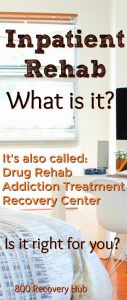Residential Drug Treatment is commonly called Inpatient Hospitalization, Drug Rehab, Inpatient Rehab and sometimes just Rehab. The most common form of Treatment or Rehab is when the person stays at the treatment center.
Inpatient Rehab usually starts with a 4 to 10-day detoxification “Detox” based on the patient’s needs (either with or without medication). Patients stay at the treatment facility. It provides a structured environment in a private, well-monitored, setting.
Residential treatment normally lasts for 30-90 days. The longer the stay, the better the success rate.
Inpatient rehab is one of the best and most successful options available. Whether it’s for yourself or for a loved one, this is the first step toward a life free from addiction.
Treatment centers also referred to as residential treatment centers, provide a number of programs. They offer a variety of tools, services, and practices to help participants begin the healing process. The combination of participation along with the support of the family can make a big difference. This has a positive impact on the success rate.
Inpatient Rehab Admissions
 Once you arrive, an intake counselor will ask questions. This will determine the possible treatment plan for your specific needs.
Once you arrive, an intake counselor will ask questions. This will determine the possible treatment plan for your specific needs.
Individualized Treatment Plan
After the intake process and admission into the facility, the client entering treatment will see the medical sta members who help to assess physical and mental health. This step is very important to the development of an individualized treatment plan. For maximum effect, the individual’s treatment plan must be reassessed and adjusted as necessary throughout the program, according to the National Institute on Drug Abuse.
Counseling during Inpatient Rehab
There are various types of counseling an individual can take part in during residential treatment. As part of the regular schedule, one might nd themselves attending large and small group counseling sessions, as well as individual counseling. At some point in the treatment program, it’s likely that family counseling will be included as well.
There are various types of counseling an individual can take part in during residential treatment. As part of the regular schedule, one might nd themselves attending large and small group counseling sessions, as well as individual counseling. At some point in the treatment program, it’s likely that family counseling will be included as well.
Ongoing Medical Assessments
A person’s health can change during treatment. Once the body is free of drugs and alcohol, the medical staff will continue to assess the need for treatment of physical or mental health conditions that co-exist with or were caused by substance abuse.
Family Programs
Family members are important. Not only do they influence the person seeking recovery, but they’re also affected by the client’s substance abuse. Most inpatient treatment facilities o er family programs to help loved ones deal with the effects of substance abuse in their family. Additionally, as family members heal, they will learn how to coexist in healthier ways with the client after rehab.
Transition Preparation
Treatment isn’t over at the end of rehabilitation. In fact, going through rehab is only part of the process. Long before the client is scheduled to complete their inpatient rehabilitation, he or she will begin working with counselors and other sta members toward a smooth transition back to home, work, and family life.
Drug Rehab Success Tips
Eat Healthy Foods
You might not think warring about your diet is a big deal while you are getting sober, but it can be. Good food and a properly balanced diet can have a positive effect on health and impact recovery. Healthy foods that are common sense like lean protein, whole grain, fruits, and vegetables are the best. This food supports good health and provides the energy you need for recovery and a sober way of life. Take advantage of the good meals offers at rehab. Avoid food that is fatty and sugary.
Get Active
Exercise on one the cheapest and easiest natural sources of stress relief. Participate in class and activities that get you fresh air and get the body moving. Even just a few minutes a day can help boost your mood.
Adults should get at least two and a half hours (150 minutes) each week of moderate-intensity aerobic physical activity. You need to do this type of activity for at least 10 minutes at a time at intervals shorter than this do not have the same health benefits. Adults should also do strengthening activities, like push-ups, sit-ups and lift weights, at least two days a week.
Learn to relax
Stress management techniques are typically taught during the rehab stay. Most of the rehabs we work with offering many types of holistic activities. This can include a variety of relaxation therapy classes ranging from horseback riding, art therapy, and yoga.
Deep breathing is an excellent way to reduce stress. Try to be open-minded and participate is several relaxation methods. You will probably want to continue with these after you leave the facility.
Make calls ahead of time
It’s best to be proactive. Learning about the different kinds of programs will help make a smoother transition into treatment. Prepare to take to your loved one about the addiction by rehearsing the conversation ahead of time. Practice with someone else. This will help move the conversation along in a natural way. We don’t want the addict to get defensive or change their mind. We will also talk to the drug addict. We can relate because of our personal experiences.
Don’t Put it Off Until Tomorrow
Substance abuse recovery is imperative to an individual’s health. Call today to begin working toward a healthier future. The professional help provided can save an individual’s life.
Having suspected or acknowledged that a problem exists with substance abuse, it’s important to take the next step by reaching out for help. We are here to support and provide information to those who want to break free from the control of drugs or alcohol and regain peace of mind, health, and happiness through sobriety.
Take the best step and contact us today. If you are shy, there are three ways to get in touch with us.
Call us, chat or send us a note. We love helping people.
